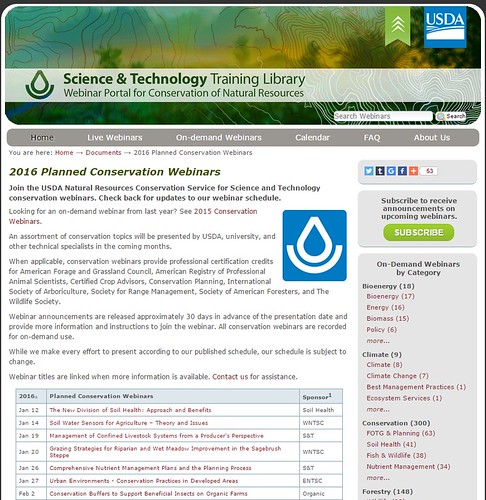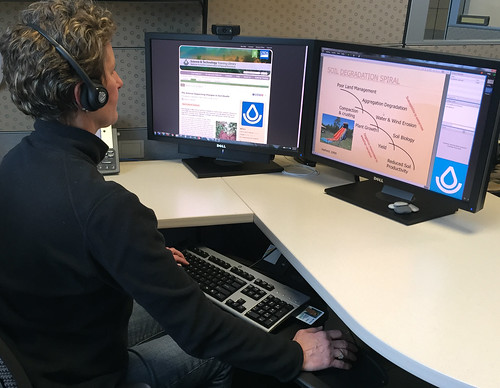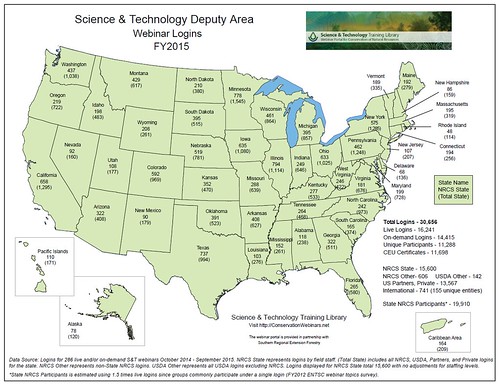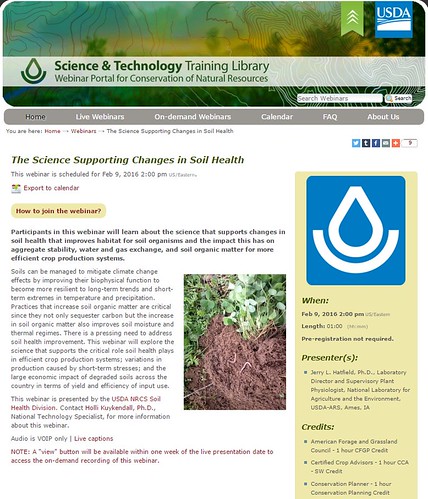
Conservation science is a broad, deep field that’s growing all the time. To help people brush up on conservation practices and learn about new technologies, USDA’s Natural Resources Conservation Service (NRCS) offers hundreds of free conservation webinars from its online Science and Technology Training Library.
Available live or on-demand, these webinars also count as Continuing Education Units for many different certifying organizations and programs.
Pennsylvania Environmental Consultant Carl DuPoldt is an avid user. “I usually watch one or two webinars a week, sometimes more,” says Dupoldt. “It’s a great way to improve my knowledge, almost like attending a training event, but without the travel costs.”
With about 60 webinars added annually, DuPoldt and other professionals have no shortage of new training materials.
Since the first webinar in 2006, topics have ranged widely over the entire field of natural resources conservation, from traditional topics such as conservation planning and nutrient management, to more specialized topics such as rotational grazing for horses and improving soil health in a vineyard.
These are just a few examples of the many, diverse webinars available on-demand. At the Science and Technology Training Library you can browse the full conservation catalogue, use the search bar to hone in on specific interests, or sign up to receive notices of upcoming webinars.

Each January, webinar committee chair Holli Kuykendall updates the schedule for the calendar year. Webinar topics are identified by NRCS technical specialists to meet upcoming training needs and by NRCS field employees to meet current training requests.
“These webinars are a valuable training tool for our employees. We choose topics based on their feedback and interests,” says Kuykendall.
NRCS employees/trainers often contribute as webinar presenters. However, partner agencies and universities also help NRCS develop many of the programming. Specialists working for NRCS partners are often among the leading scientists in their field; their contribution is extremely valuable.
Mace Vaughan, pollinator program director for the Xerces Society, has helped develop multiple webinars. “This is a fantastic collaboration,” says Vaughan. “Xerces provides strong conservation knowledge and expertise about beneficial insects, NRCS shows people how to apply these conservation practices and get started. Everyone wins.”
Conservation webinars provide personal enrichment and development, but they’re also accredited.
When applicable, conservation webinars provide professional certification credits for American Forage and Grassland Council, American Registry of Professional Animal Scientists, Certified Crop Advisors, Conservation Planning, Society for Range Management, Society of American Foresters and The Wildlife Society.
NRCS Agronomist Dana Ashford uses webinars to stay sharp. “Continuing education is a critical component in professional development. Technology and scientific research evolves over time, and keeping your edge can be hard with increasing workload,” says Ashford.
Webinars allow Ashford to train efficiently. “A recent webinar featured interviews with three producers. It was like attending three different field days, and I was able to do it sitting in my office.”
“Spending an hour to get the latest information on a topic is a relatively easy sell, especially if you can get a free Continuing Education Unit,” says Ashford. “I always recommend the Science and Technology Training Library as a great resource for current information and CEUs.”

NRCS offers conservation webinars year-round. Online hosting, automated reminders and CEU reporting are made possible by our conservation partner, Southern Regional Extension Forestry. Thousands of people from all over the world view these webinars each year. In 2015, we recorded more than 30,600 separate log-ins.
“These webinars are such fun to work on,” says Kuykendall. “I especially like it that as a federal agency we provide this fantastic learning opportunity to everyone with access to an internet connection.”
As conservation science and technology advances, so will our catalogue of available webinars. Please tune in any time; space is not limited: www.conservationwebinars.net.



